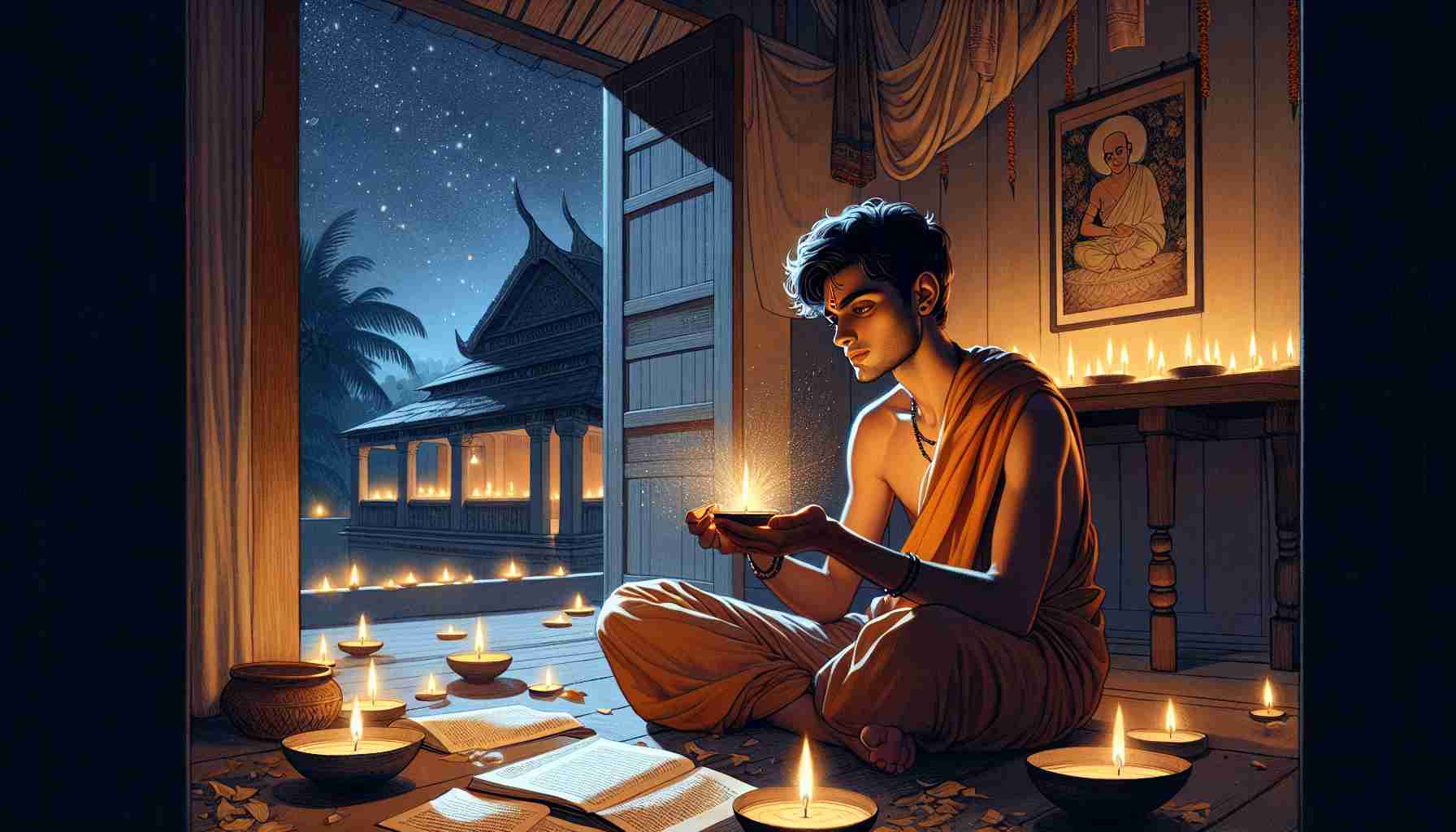

I was seventeen when my father passed.
He had been a schoolteacher—quiet, kind, always quoting shlokas from the Bhagavad Gita as though they were his breath. He died suddenly, on a morning so ordinary it made no sense that such a thing could happen. One minute, he was adjusting his sandals at the door; the next, everything went silent.
After his funeral, responsibilities landed on me like a mountain. Ma stopped eating much. My younger sister, just ten, watched me with eyes so wide, like she didn’t want to blink in case I left too.
I resented it all.
Why us? Why him? Why now?
At school, others still laughed, worried about exams. I walked in shadows, carrying more than anyone could see. Sometimes I would go to the temple near our house, not to pray, but to sit in the back, beyond the flicker of the lamps. I told myself I wasn’t angry at the gods—just tired.
One evening, I saw an old man lighting a dozen diyas — little clay lamps — even though the wind was strong. He kept shielding them with his palms, relighting them each time they died. I stared at him for a long time.
“Why do you keep lighting them?” I finally asked.
“They’re small,” he said, smiling gently, “but they still shine.”
Those words echoed later that night when I sat on the rooftop alone. I remembered something my father once said as we walked to the river:
“Dharma doesn’t always look fair, but it is always strong. You follow it not because life is easy, but because it’s right.”
And in that moment, I thought of Arjuna from the Mahabharata — the warrior who didn’t want to fight his own family. In the Bhagavad Gita (2.47), Lord Krishna tells him, “You have a right to perform your duty, but not to the fruits of your actions.” My father had quoted that line often. It had annoyed me then. Now I understood.
My duty wasn’t about victory or fairness. It was about showing up — for Ma, for my sister, for myself.
I began waking early again. I made our meals. I helped my sister with her studies. I started tutoring two boys in the neighborhood for extra money. No miracle came, but the weight didn’t crush me the way it used to.
The Shanti Parva in the Mahabharata says, “Dharma is subtle — it walks softly, guiding even when unseen.” I used to think strength came from being unshaken. But sometimes, it’s in swaying and staying.
Months later, my sister whispered during pooja, “Appa would be proud.”
I didn’t cry. Instead, I smiled and lit an extra diya.
Because though life still felt unfair, I wasn’t asking why anymore.
I was choosing to stand — not for reward, but for dharma.
And that was strength I didn’t know I had.
I was seventeen when my father passed.
He had been a schoolteacher—quiet, kind, always quoting shlokas from the Bhagavad Gita as though they were his breath. He died suddenly, on a morning so ordinary it made no sense that such a thing could happen. One minute, he was adjusting his sandals at the door; the next, everything went silent.
After his funeral, responsibilities landed on me like a mountain. Ma stopped eating much. My younger sister, just ten, watched me with eyes so wide, like she didn’t want to blink in case I left too.
I resented it all.
Why us? Why him? Why now?
At school, others still laughed, worried about exams. I walked in shadows, carrying more than anyone could see. Sometimes I would go to the temple near our house, not to pray, but to sit in the back, beyond the flicker of the lamps. I told myself I wasn’t angry at the gods—just tired.
One evening, I saw an old man lighting a dozen diyas — little clay lamps — even though the wind was strong. He kept shielding them with his palms, relighting them each time they died. I stared at him for a long time.
“Why do you keep lighting them?” I finally asked.
“They’re small,” he said, smiling gently, “but they still shine.”
Those words echoed later that night when I sat on the rooftop alone. I remembered something my father once said as we walked to the river:
“Dharma doesn’t always look fair, but it is always strong. You follow it not because life is easy, but because it’s right.”
And in that moment, I thought of Arjuna from the Mahabharata — the warrior who didn’t want to fight his own family. In the Bhagavad Gita (2.47), Lord Krishna tells him, “You have a right to perform your duty, but not to the fruits of your actions.” My father had quoted that line often. It had annoyed me then. Now I understood.
My duty wasn’t about victory or fairness. It was about showing up — for Ma, for my sister, for myself.
I began waking early again. I made our meals. I helped my sister with her studies. I started tutoring two boys in the neighborhood for extra money. No miracle came, but the weight didn’t crush me the way it used to.
The Shanti Parva in the Mahabharata says, “Dharma is subtle — it walks softly, guiding even when unseen.” I used to think strength came from being unshaken. But sometimes, it’s in swaying and staying.
Months later, my sister whispered during pooja, “Appa would be proud.”
I didn’t cry. Instead, I smiled and lit an extra diya.
Because though life still felt unfair, I wasn’t asking why anymore.
I was choosing to stand — not for reward, but for dharma.
And that was strength I didn’t know I had.